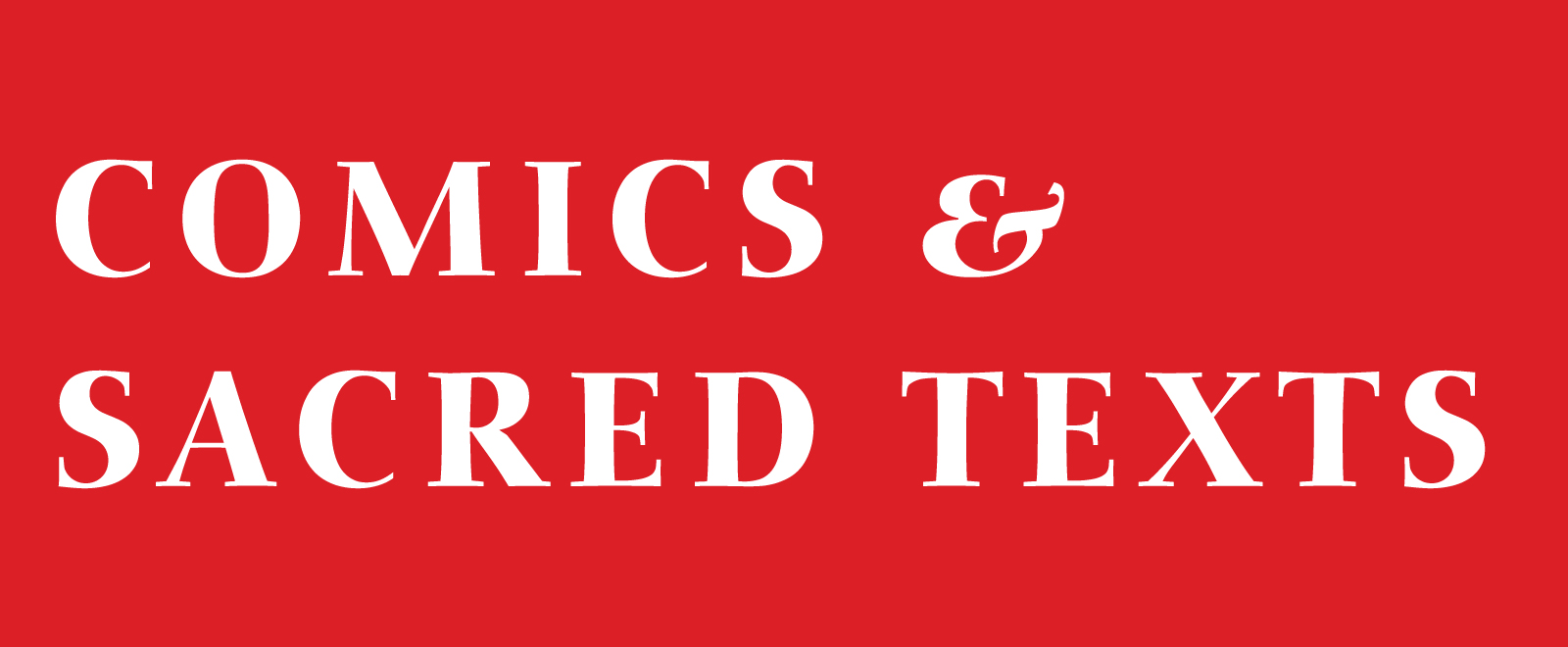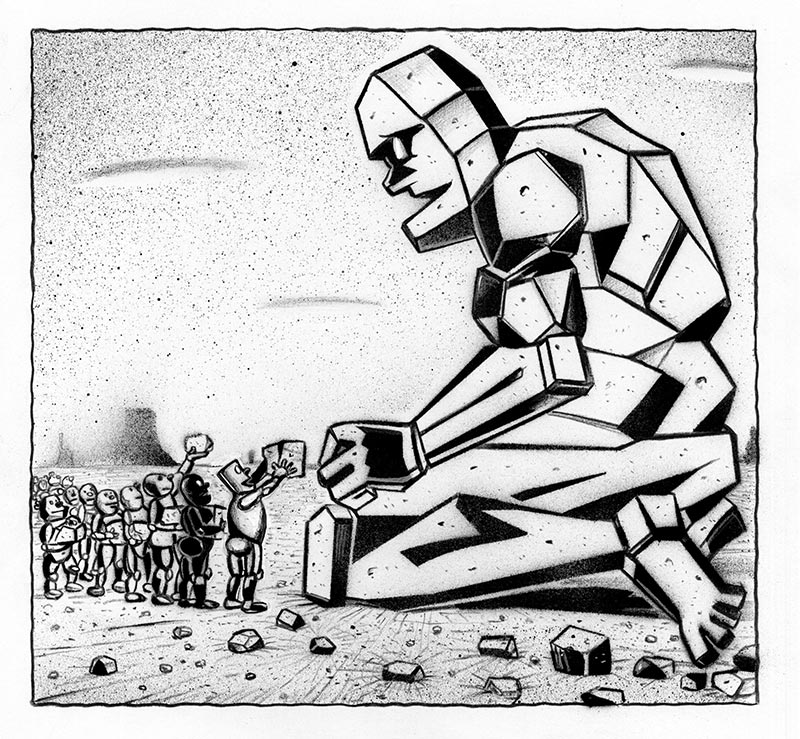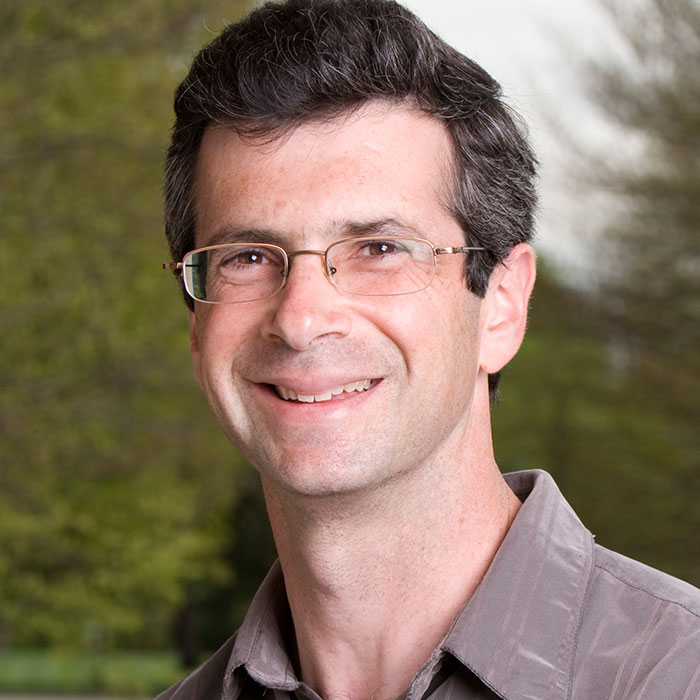Comics and Sacred Texts
Organized by Ken Koltun-Fromm
Friday, May 6th, 2016

Drawing together the Israeli Cartoon Museum exhibit Bible Stories in Comics, student artistic work in the course Reading Comics and Religion, and contributors to the edited volume Sacred Texts and Comics: Religion, Faith, and Graphic Narratives, the symposium Comics and Sacred Texts will engage the visual registers of religious expression across a broad spectrum of religious traditions.
Panel discussions will cover a range of topics in comic and religious studies, including: Seeing the Sacred in Comics; Reimagining Sacred Texts through Comics; Transfigured Comic Selves, Monsters, and the Body; and the Everyday Sacred in Comics. All panels are open to the public.
The last decade has produced critical and expressive studies in sacred canonical texts and comics. Witness, for example, the artistic works from R. Crumb’s The Book of Genesis (2009) and JT Waldman’s Megillat Esther (2005), as well as scholarly publications from Karline McLain’s India's Immortal Comic Books (2009), A. David Lewis’s edited volume Graven Images: Religion in Comic Books & Graphic Novels (2010), and Samantha Baskind’s and Ranen Omer-Sherman’s editorial work for The Jewish Graphic Novel: Critical Approaches (2010). The symposium Comics and Sacred Texts at Haverford College builds upon these focused studies to develop a broader landscape of religious graphic expression of the sacred. The symposium will engage Islamic, Jewish, Christian, Hindu, and Buddhist traditions, together with explorations of the superhuman body. The invited panelists will draw from their own disciplinary and cross-disciplinary perspectives—including religion, literature, theology, gender studies, art history, cultural theory, and anthropology—to energize a lively discussion about representations of the sacred in graphic narratives.
Comics and Sacred Texts is organized in conjunction with the Haverford-Swarthmore spring 2016 course “Reading Comics and Religion,” taught by Yvonne Chireau (Swarthmore) and Ken Koltun-Fromm (Haverford), and is presented by the John B. Hurford ’60 Center for the Arts and Humanities, its Tuttle Creative Residencies Program, the Distinguished Visitors Program, and the Gest Program Fund, Haverford College.
Schedule
All events in Stokes 102 unless noted otherwise. View Campus Map
May 6th, 2016
9:00-10:30 a.m.
Panel 1: Reimagining Sacred Texts through Comics
- Leonard V Kaplan, Mortimer M. Jackson Professor of Law Emeritus, University of Wisconsin Law School
- Leah Hochman, Director, the Louchheim School for Judaic Studies, USC; Associate Professor of Jewish Thought at Hebrew Union College-Jewish Institute of Religion
- Karline McLain, Associate Professor of Religious Studies, Department Chair, Bucknell University
- Ranen Omer-Sherman, JHFE Endowed Chair in Judaic Studies at the University of Louisville
10:30-11 a.m.
Coffee break
11 a.m.-12:30 p.m.
Panel 2: Transfigured Comic Selves, Monsters, and the Body
- Samantha Baskind, Professor of Art History, Cleveland State University
- Scott Elliott, Associate Professor in the Department of Philosophy and Religion, Adrian College
- Jeffrey L. Richey, Francis Alexander McGaw Chair in Religion, Berea College
- Samantha Langsdale, Philosophy & Religion Department, University of North Texas
- Matthew S. Haar Farris, Department of Philosophy, California State University, Fresno
12:30-1:30 p.m.
Lunch
CPGC Café, Stokes 104
1:30-3:00 p.m.
Panel 3: Bordering Religion: Representing Religion in Comics
- Elizabeth Rae Coody, Iliff School of Theology
- A. David Lewis, Editor, Graven Images: Religion in Comic Books & Graphic Novels (2010), Muslim Superheroes (2017)
- Assaf Gamzou, Curator, Israeli Cartoon Museum
- JT Waldman, Author, Megillat Esther
3-3:30 p.m.
Coffee Break
3:30-5:00 p.m.
Panel 4: The Everyday Sacred in Comics
- Ofra Amihay, Israel Institute Postdoctoral Fellow, Georgetown University
- Shiamin Kwa, Assistant Professor on the Jye Chu Lectureship in Chinese Studies, Bryn Mawr College
- Joshua Plencner, Assistant Teaching Professor of Politics, Drexel University
- Ken Koltun-Fromm, Professor of Religion, Haverford College
Exhibition
Biblical Proportions: Stories from the Testaments in Comics
Stokes 102, Hurford Center Seminar Room
In conjunction with the Comics and Sacred Texts symposium, the Hurford Center will host the exhibition “Biblical Proportions: Stories from the Testaments in Comics” in its Stokes 102 seminar room. Organized by Assaf Gamzou, Curator of The Israeli Cartoon Museum, the exhibition provides a visual window into religious culture and sensibilities, following eight narratives found repeatedly in comics: the Genesis creation story, Adam & Eve, Cain & Abel, Abraham (and through him a discussion of other prophets), Moses, Samson, Queen Esther, and the Apocalypse. Exploring the different ways in which these narrative themes, tropes, and archetypes inform the comic works, the exhibition embraces a more expansive notion of the religious imagination. The installation features over 120 pieces, ranging from the mainstream world of superheroes to art-infused Indie comics. It includes works by artists such as Robert Crumb, Chris Ware, Basil Wolverton, JT Waldman, and Frank Quitely.
And I here make a rule–a great and lasting story is about everyone or it will not last. The strange and foreign is not interesting–only the deeply personal and familiar. — John Steinbeck, East of Eden
While there is no obvious connection between the Bible and Comics, it is not rare to find Biblical narratives in graphic form. Artists turn to the Bible to find stories, inspiration and themes. Artists base their work, consciously or unconsciously, on thousands of years of other artists' readings and drawings of these texts, all trying to create a unique and new interpretation of the original story.
The exhibition follows four narratives, which are found repeatedly in comics: Genesis, Adam, Abraham (and through him a discussion of prophecy) and the Apocalypses. The exhibition aims to explore the different ways in which these narratives, their themes, tropes and archetypes inform and influence visual culture to this day.
Assaf Gamzou
The Israeli Cartoon Museum

Image: Peter Kuper
Speakers

Scott S. Elliott
Scott Elliott earned his PhD in Biblical Studies (New Testament and Early Christianity) from Drew University in Madison, New Jersey. His dissertation focused on characters and characterization in the Gospel of Mark, and was later published as Reconfiguring Mark’s Jesus: Narrative Criticism after Poststructuralism (Sheffield Phoenix Press, 2011). He is currently an Associate Professor in the Department of Philosophy and Religion at Adrian College, Adrian, Michigan, where he teaches courses in Bible, ancient fiction, and literary theory. He is author of “Jesus in the Gutter: Comics and Graphic Novels Reimagining the Gospels” (Postscripts 2011) and is presently writing the chapter on “Graphic Bibles” for The Oxford Handbook to the Bible in American Popular Culture.

Ranen Omer-Sherman
Ranen Omer-Sherman is The JHFE Endowed Chair in Judaic Studies at the University of Louisville. He is the author or editor of five books including Diaspora and Zionism in Jewish American Literature: Lazarus, Syrkin, Reznikoff, Roth (2002), Israel in Exile: Jewish Writing and the Desert (2006), The Jewish Graphic Novel: Critical Approaches (2008),Narratives of Dissent: War in Contemporary Israeli Arts and Culture (2013), and Imagining Kibbutz: Visions of Utopia in Literature and Film (2015) as well as numerous essays on Jewish writers. His reviews often appear in the Forward and the Jewish Book Council.

Elizabeth Coody
Elizabeth Rae Coody holds a Ph.D. in Religious and Theological Studies from the joint program between the University of Denver and Iliff School of Theology; she teaches writing at the Iliff School of Theology. Her passion for understanding the way biblical texts are understood by contemporary Western audiences has led her to study the way reading comics can inform and invigorate the study of the Bible. Her dissertation, Imagining the Scandal of the Cross with Graphic/Novel Reading, addresses the issues and possibilities that come with using comics as a window into views of Jesus's crucifixion. She is an active member of the Society of Biblical Literature.

Karline McLain
Karline McLain is Associate Professor of Religious Studies at Bucknell University. Her first book is India’s Immortal Comic Books: Gods, Kings, and Other Heroes (Indiana University Press, 2009), which explores how an incredibly popular comic book series helped to define what it means to be Hindu and Indian for several generations of readers, and examines how the national canon of mythological and historical Indian heroes created through this graphic medium aligned with Hindu nationalist ideology. This book received the Edward Cameron Dimock, Jr. Prize from the American Institute of Indian Studies for its contribution to the Indian humanities. Her most recent book is The Afterlife of Sai Baba: Competing Visions of a Global Saint (Washington University Press, 2016).

Jeffrey L. Richey
Jeffrey L. Richey (Ph.D., Graduate Theological Union; M.T.S., Harvard University; B.A., UNC-Greensboro) holds the Francis Alexander McGaw Chair in Religion at Berea College, where he is Professor of Religion and Asian Studies. He has authored, edited, and contributed to numerous volumes devoted to the study of East Asian religions, including Daoism in Japan: Chinese Traditions and Their Influence on Japanese Culture (Routledge, 2015), Confucius in East Asia: Confucianism’s History in China, Korea, Japan, and Viet Nam (Association for Asian Studies, 2013), and Teaching Confucianism (Oxford University Press, 2008). He also serves as the Internet Encyclopedia of Philosophy’s Area Editor for Chinese Philosophy (www.iep.utm.edu/category/traditions/chinese/).

Ofra Amihay
Ofra Amihay is an Israel Institute postdoctoral fellow at Georgetown University. She holds a Ph.D. from NYU and has published articles on comics, children's literature, Hebrew literature and photography. In 2015 she curated the photography exhibition "Text and the City" in the Museum of Contemporary Art in Zagreb, Croatia. She is the co-editor of the volume The Future of Text and Image (Cambridge Scholars, 2012).

Joshua Plencner
Joshua Plencner is an Assistant Teaching Professor of Politics at Drexel University. He joined the Politics faculty in September 2015 after completing his PhD in the Department of Political Science at the University of Oregon in December 2014. Working in the middle ground between American politics and political theory, his research explores the intersection American visual culture and the politics of race, with specializations in the study of racial formation in popular culture, affect theory, comics studies, and American Political Development.

Shiamin Kwa
Shiamin Kwa teaches courses on East Asian Literature and Film. She is the author of Strange Eventful Histories: Identity, Performance and Xu Wei’s Four Cries of a Gibbon, and the co-editor of Mulan: Five Versions of a Classic Chinese Legend. She has also written articles on the opera of Giuseppe Verdi and the detective fiction of Leonardo Sciascia. Her current research focuses on issues of translation, adaptation, and global circulation in narrative fiction and theatrical performance.

Samantha Baskind
Samantha Baskind, Professor of Art History at Cleveland State University, is the author of four books, and co-editor, with Ranen Omer-Sherman, of the foundational volume, The Jewish Graphic Novel: Critical Approaches. Her work has been funded by the National Endowment for the Humanities, American Council of Learned Societies, the Hadassah-Brandeis Institute, and the Memorial Foundation for Jewish Culture, among others. She served as editor for U.S. art for the 22-volume revised edition of the Encyclopaedia Judaica and is currently series editor of “Dimyonot: Jews and the Cultural Imagination,” published by the Pennsylvania State University Press.

Leonard V. Kaplan
Professor Leonard Kaplan received his undergraduate and law degrees from Temple University in 1962 and 1965, and an LL.M from Yale Law School in 1966. He received a Ph.D. in Psychology from the University of Chicago in 1977, and he was a Research Fellow at the Chicago Institute for Psychoanalysis. He taught at the University of Nebraska Law School from 1966 to 1968, and served as a Staff Attorney in the office of Community Legal Counsel in Chicago from 1971 to 1974, when he joined the University of Wisconsin Law School faculty. Professor Kaplan has co-edited six books and written over thirty articles. He was a co-founder and co-editor-in-chief of a journal, Graven Images: Studies in Culture, Law and the Sacred, now a book series with Lexington Books (Rowman Littlefield). He is the director of the Law School's Project for Law and the Humanities. He also has been a member of the Editorial Board of the International Journal of Law and Psychiatry since 1977. He has served on the organizing committee for International Congresses on Law and Psychiatry through the 1990s to date. Professor Kaplan was First Vice President, and a member of the Executive Board of Directors of the International Academy of Law and Mental Health since 1992. In 2009 he became President-elect of the organization. In 2002, Professor Kaplan received the Academy's Michael Zeegers Lifetime Achievement Award for distinction in the pursuit of Scholarship, Pedagogy, and Human Rights Initiatives in the field of Law and Mental Health.

Dr. Leah Hochman
Dr. Leah Hochman directs the Louchheim School for Judaic studies at the University of Southern California and serves as associate professor of Jewish Thought at Hebrew Union College-Jewish Institute of Religion (HUC-JIR) in Los Angeles.
Raised in the Seattle area, she came to Southern California to earn her undergraduate degree at Pitzer College in Claremont before moving east for graduate work. She received her M.A. and Ph.D. in religion and literature from Boston University, where she wrote her dissertation on Moses Mendelssohn’s theories of religion and language. Dr. Hochman spent a year in Berlin as a post-doctoral fellow at the Moses Mendelssohn Zentrum and has continued to return to Germany regularly to research and lead classes. Before coming to HUC in LA in 2008, she was assistant professor of religion and Jewish studies at the University of Florida and taught in the Great Books program at BU.
At HUC, she teaches classes in medieval and modern philosophy, American Judaism, modern history, and food ethics. At USC, she teaches classes on contemporary Jewish literature, Jewish identity and the academic study of Judaism.

Matthew S. Haar Farris
Matthew S. Haar Farris is an interdisciplinarian who works at the interstices of philosophy and religious studies, especially contemporary continental philosophy and theory and methods for the study of religion. His work has been published in The Pacific Coast Theological Society Journal and Pastoral Psychology. He is the author of a chapter in the forthcoming volume, Sacred Texts and Comics: Religion, Faith, and Graphic Narratives. Also known as TwoTrees, he is the recipient of the Wabash Center’s Workshop for Early Career Religion Faculty at Colleges and Universities. Matthew is a Lecturer at California State University, Fresno, where he teaches a variety of courses in philosophy and religious studies.

Samantha Langsdale
Dr. Samantha Langsdale earned her PhD from SOAS, University of London in 2014 and her research interests include feminist philosophy, contemporary critical theory, visual culture, embodiment, religions, and women in popular culture. She is currently a Lecturer in Philosophy & Religion at the University of North Texas, and is also the Editor of an independent feminist publication called GEEKED Magazine, which features content exploring comics, culture, and gender.

A. David Lewis
Graphic novelist, college educator, and comics studies scholar, A. David Lewis holds a Ph.D. in Religion & Literature from Boston University based on a study of the superhero afterlife and the hermeneutics of selfhood, and an M.A. in English Literature from Georgetown University. He started lecturing on comics as well as writing short back-up stories for various anthologies back in 1999 as he graduated from Brandeis University with a B.A. in both English and Psychology. Critically praised for his creative work in independent comics, Lewis has been featured in The Boston Globe, Publishers Weekly, Bostonia and on WAMU’s Interfaith Voices, MSNBC's The Shift, and Boston’s NPR affiliate WBUR. His academic works include the Eisner Award-nominated American Comics, Literary Theory and Religion: The Superhero Afterlife (2014), and his co-edited volume Graven Images: Religion in Comic Books and Graphic Novels (2010, with Christine Hoff Kraemer). Lewis is a founding member of Sacred & Sequential, an Executive Board member of the Comics Studies Society, and co-editor of the forthcoming Muslim Superheroes: Comics, Islam, and Representation (2017, with P. Martin Lund).

Assaf Gamzou
Assaf Gamzou started publishing "Saharoori" (Moonstruck), a monthly satirical comics magazine, at the age of 20. He later on attended the "Ofakim" Scholarship program at Tel-Aviv University, where he Received his B.A. Com Laude in Jewish Philosophy and Comparative Literature. Upon graduation he started teaching at the high school and college level. He currently serves as curator of the Israeli Cartoon Museum, where he has curated exhibitions, both Israeli and International, on editorial cartoons, comics and graphic novels.

JT Waldman
JT Waldman (1976 - ) is a comic book creator and digital designer based in Philadelphia. He is best known for his graphic novel, Megillat Esther, published in 2005 by the Jewish Publication Society. In 2012, his collaboration with Harvey Pekar, Not the Israel My Parents Promised Me, reached the New York Times Best Seller List. He contributed to two books that detail the intersection of comic books and Judaism, From Krakow to Krypton and The Jewish Graphic Novel as well as the historical anthologies, Colonial Comics and The Graphic Canon Vol I. JT lectures at colleges, universities, and conferences on topics ranging from comic books and religion to visual narratives and Midrash.
Organizer

Ken Koltun-Fromm
As a member of the religion department at Haverford College, Ken Koltun-Fromm teaches a wide range of courses in modern Jewish thought and culture, together with material studies in religion. His research focuses on Jewish conceptions of identity, authority, authenticity, and materiality. He has published four books–Moses Hess and Modern Jewish Identity (2001), Abraham Geiger’s Liberal Judaism: Personal Meaning and Religious Authority (2006), Material Culture and Jewish Thought in America (2010), and Imagining Jewish Authenticity: Vision and Text in American Jewish Thought (2015)–and one edited volume, Thinking Jewish Culture in America (2014). He is currently co-editing two projects–one on conceptions of the Jewish God and the other on Sacred Texts and Graphic Novels.